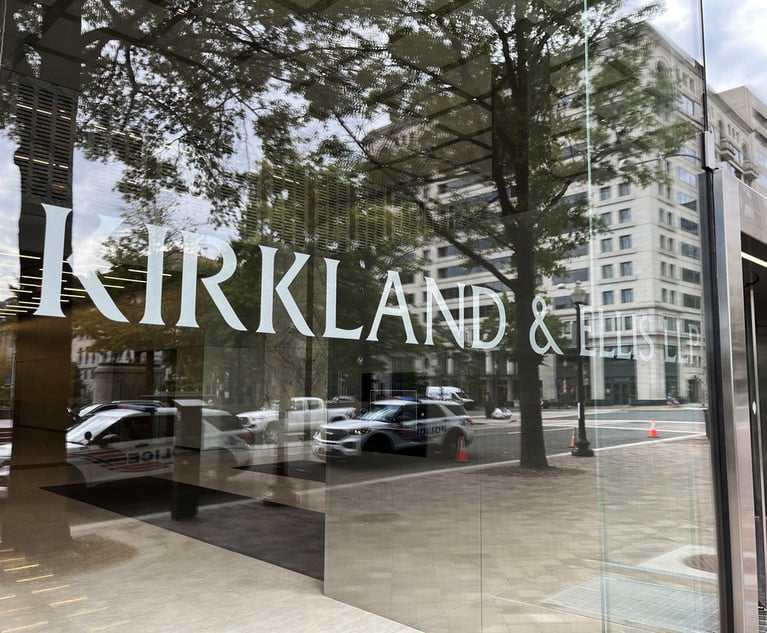Ropes to split from 100-strong team as firm pulls out of patent prosecution work
US firm to spin off patent prosecution practice into new independent firm
March 08, 2017 at 04:37 AM
5 minute read
About 100 lawyers and staff are poised to leave Ropes & Gray within the next few months, as the US firm prepares to spin off its patent prosecution practice into an independent firm.
The move by Ropes represents a major restructuring of the firm's intellectual property (IP) practice, the bulk of which stems from the firm's 2004 acquisition of 160-lawyer IP boutique Fish & Neave.
Ropes expects the process of creating a new firm focused on patent prosecution to take several months. It is understood that the move will have no impact on the US firm's London office.
Joseph Guiliano, co-head of Ropes & Gray's IP rights management practice in New York, will lead the as-yet-unnamed new firm. Guiliano and Ropes chairman Bradford Malt confirmed the restructuring of the firm's IP practice in an evening interview with The American Lawyer. The two lawyers attributed the decision to finding the best way to serve clients, who were consulted on the proposed transition.
"We are still a committed, IP-driven firm, whether it's in IP litigation, IP transactions, trademarks or other aspects of patents that are integrated into our other practice areas," said Malt, noting that Ropes & Gray's life sciences, M&A and public offerings groups all touch on certain areas of IP, whether it be through litigation risk assessments or disclosures related to new technology.
Among the many things that will change at Ropes is that the 1,160-lawyer firm will no longer do patent prosecution work, Malt said. He declined to discuss how much revenue the patent prosecution practice generated within the past year, but noted that Ropes will have a close, if not exclusive, referral relationship with the new firm being created.
"There has been a lot of talk recently about the need for law firms to innovate and do work cheaper and faster," Malt said. "If you step back and look at this from 20,000 feet, Joe and I had to find a way to serve clients with the proper overhead, cost structure and leverage ratios. And we had to look at whether [patent prosecution] belonged in the environment of a large firm."
Guiliano, a former Fish & Neave lawyer, said he is still working out the "size and constituency" of his new firm, which will initially have offices in New York and Silicon Valley. He estimated the number of lawyers and other employees – such as patent agents and other technical staffers – expected to join the new firm at about 100. Guiliano acknowledged that not everyone affected by the spin-off might make the move to the new firm. Some individuals whose work touches on other areas of IP that Ropes will continue to handle could stay at the firm, he said, while others will likely choose to head elsewhere.
Anita Varma, co-head of Ropes' IP rights group in Boston, is among those leaving the firm, Guiliano said. Her biography page was recently taken down from the Ropes website and Guiliano is now listed as the group's sole leader. Varma did not immediately respond to a request for comment.
The American Lawyer reported in January on Paul Weiss Rifkind Wharton & Garrison's hire of longtime Ropes & Gray IP litigation partner Steven Baughman in Washington DC, where he headed the firm's post-grant US Patent and Trademark Office invalidity challenge and trial practice.
McDermott Will & Emery has added three IP litigation partners from Ropes – Ian Brooks, Nicole Jantzi and Paul Schoenhard – this year in Washington DC, where Jones Day recruited Ropes IP litigation partner Christopher Harnett in January. Malt said the increased lateral activity from the firm's IP group was due to the upcoming restructuring, as well as other changes that have affected the wider IP field.
As noted by The American Lawyer last month, the creation five years ago of the Patent Trial and Appeal Board (PTAB) moved patent disputes into a less costly litigation venue. The creation of PTAB practices tightened competition in the IP arena, even as larger, general practice firms moved into the area, many by acquiring boutiques.
"Looking at IP more broadly, PTAB definitely moved litigation to quicker, more efficient forums, and a US Supreme Court ruling reduced some IP litigation," said Malt. "I think you see a lot of big firms now realising that they're a bit oversized in IP."
The US Supreme Court's 2014 ruling in Alice v CLS Bank International narrowed and clarified the scope of what can be considered patentable subject matter, which some have argued makes patent prosecution all the more important for clients.
When asked what Ropes' decision to spin off its patent prosecution group might mean for others in his field, Guiliano said every firm must analyse its own situation, rather than use his group's move to proclaim the new rise – or disappearance – of IP boutiques.
"We realised that there were certain trends that happened in Big Law, but now there's almost a next-level type of analysis going on," Guiliano said. "For us, it just made sense to work at a smaller firm."
This content has been archived. It is available through our partners, LexisNexis® and Bloomberg Law.
To view this content, please continue to their sites.
Not a Lexis Subscriber?
Subscribe Now
Not a Bloomberg Law Subscriber?
Subscribe Now
NOT FOR REPRINT
© 2024 ALM Global, LLC, All Rights Reserved. Request academic re-use from www.copyright.com. All other uses, submit a request to [email protected]. For more information visit Asset & Logo Licensing.
You Might Like
View All
Newly-Appointed Kirkland Clinches Victory at Supreme Court in Longrunning Sky Feud
3 minute read
Latham Suffers Latest Departure as Skadden Swoops for London IP Head
2 minute read
Kirkland & Ellis Triumphs in High Court Cancer Treatment Patent Case

Trending Stories
- 1Judge Denies Sean Combs Third Bail Bid, Citing Community Safety
- 2Republican FTC Commissioner: 'The Time for Rulemaking by the Biden-Harris FTC Is Over'
- 3NY Appellate Panel Cites Student's Disciplinary History While Sending Negligence Claim Against School District to Trial
- 4A Meta DIG and Its Nvidia Implications
- 5Deception or Coercion? California Supreme Court Grants Review in Jailhouse Confession Case
Who Got The Work
Michael G. Bongiorno, Andrew Scott Dulberg and Elizabeth E. Driscoll from Wilmer Cutler Pickering Hale and Dorr have stepped in to represent Symbotic Inc., an A.I.-enabled technology platform that focuses on increasing supply chain efficiency, and other defendants in a pending shareholder derivative lawsuit. The case, filed Oct. 2 in Massachusetts District Court by the Brown Law Firm on behalf of Stephen Austen, accuses certain officers and directors of misleading investors in regard to Symbotic's potential for margin growth by failing to disclose that the company was not equipped to timely deploy its systems or manage expenses through project delays. The case, assigned to U.S. District Judge Nathaniel M. Gorton, is 1:24-cv-12522, Austen v. Cohen et al.
Who Got The Work
Edmund Polubinski and Marie Killmond of Davis Polk & Wardwell have entered appearances for data platform software development company MongoDB and other defendants in a pending shareholder derivative lawsuit. The action, filed Oct. 7 in New York Southern District Court by the Brown Law Firm, accuses the company's directors and/or officers of falsely expressing confidence in the company’s restructuring of its sales incentive plan and downplaying the severity of decreases in its upfront commitments. The case is 1:24-cv-07594, Roy v. Ittycheria et al.
Who Got The Work
Amy O. Bruchs and Kurt F. Ellison of Michael Best & Friedrich have entered appearances for Epic Systems Corp. in a pending employment discrimination lawsuit. The suit was filed Sept. 7 in Wisconsin Western District Court by Levine Eisberner LLC and Siri & Glimstad on behalf of a project manager who claims that he was wrongfully terminated after applying for a religious exemption to the defendant's COVID-19 vaccine mandate. The case, assigned to U.S. Magistrate Judge Anita Marie Boor, is 3:24-cv-00630, Secker, Nathan v. Epic Systems Corporation.
Who Got The Work
David X. Sullivan, Thomas J. Finn and Gregory A. Hall from McCarter & English have entered appearances for Sunrun Installation Services in a pending civil rights lawsuit. The complaint was filed Sept. 4 in Connecticut District Court by attorney Robert M. Berke on behalf of former employee George Edward Steins, who was arrested and charged with employing an unregistered home improvement salesperson. The complaint alleges that had Sunrun informed the Connecticut Department of Consumer Protection that the plaintiff's employment had ended in 2017 and that he no longer held Sunrun's home improvement contractor license, he would not have been hit with charges, which were dismissed in May 2024. The case, assigned to U.S. District Judge Jeffrey A. Meyer, is 3:24-cv-01423, Steins v. Sunrun, Inc. et al.
Who Got The Work
Greenberg Traurig shareholder Joshua L. Raskin has entered an appearance for boohoo.com UK Ltd. in a pending patent infringement lawsuit. The suit, filed Sept. 3 in Texas Eastern District Court by Rozier Hardt McDonough on behalf of Alto Dynamics, asserts five patents related to an online shopping platform. The case, assigned to U.S. District Judge Rodney Gilstrap, is 2:24-cv-00719, Alto Dynamics, LLC v. boohoo.com UK Limited.
Featured Firms
Law Offices of Gary Martin Hays & Associates, P.C.
(470) 294-1674
Law Offices of Mark E. Salomone
(857) 444-6468
Smith & Hassler
(713) 739-1250










